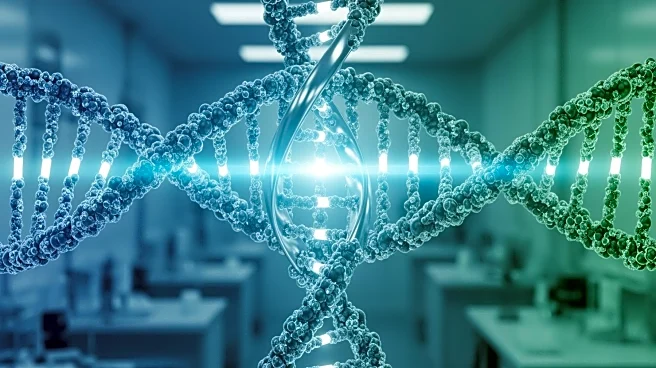What's Happening?
Dyno Therapeutics, a genetic technologies company based in Watertown, Massachusetts, has announced the development of Dyno-bn8, a novel adeno-associated virus (AAV) gene delivery vector. This new vector targets skeletal and cardiac muscle, offering significant
improvements in delivery efficacy and safety potential. The announcement was made at Dyno's Genetic Agency Technology Conference (GATC). The Dyno-bn8 vector has been demonstrated in non-human primate studies to achieve therapeutic delivery at a significantly lower dose compared to existing therapies, reducing the required dose by 25-fold. This advancement is expected to lower manufacturing costs and improve safety by minimizing liver exposure. The vector's design leverages artificial intelligence to enhance muscle tropism and detarget the liver, addressing common challenges in gene therapy delivery.
Why It's Important?
The introduction of Dyno-bn8 represents a significant advancement in the field of gene therapy, particularly for muscle and neuromuscular diseases. Current AAV vectors often require high doses to be effective, which can lead to liver toxicity and other side effects. By reducing the necessary dose and improving targeting, Dyno-bn8 could make gene therapies safer and more accessible. This development has the potential to transform treatment options for patients with muscle-related genetic disorders, offering a more efficient and cost-effective solution. Additionally, the ability to license this technology to other gene therapy developers could accelerate the availability of new treatments, benefiting a broader range of patients.
What's Next?
Dyno Therapeutics plans to make Dyno-bn8 available for licensing to gene therapy developers and partners through its Dyno Frontiers Program. The company is also preparing for clinical readiness by demonstrating the vector's effectiveness in human muscle cell lines and ensuring compatibility with existing manufacturing processes. As the technology becomes available for broader use, it is likely to attract interest from pharmaceutical companies and researchers looking to develop new gene therapies. The success of Dyno-bn8 could lead to further collaborations and partnerships, potentially expanding its application to other therapeutic areas.

















